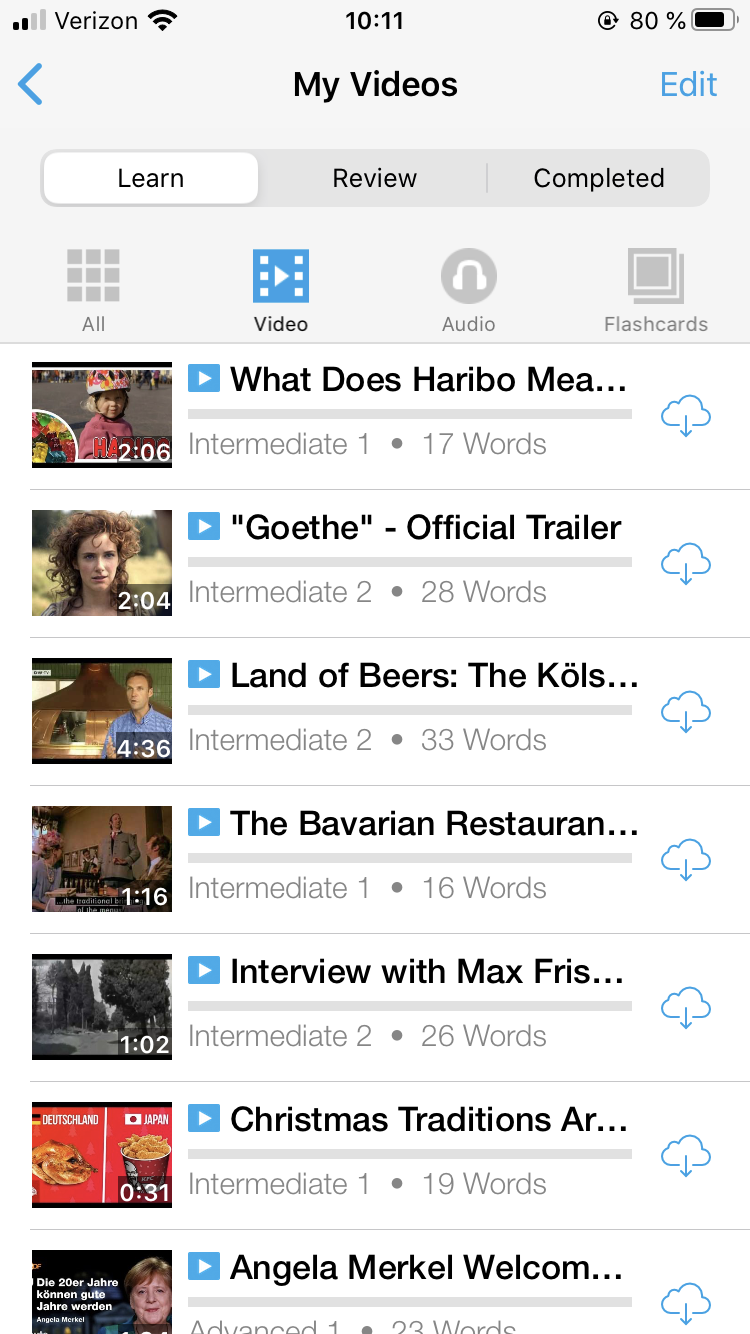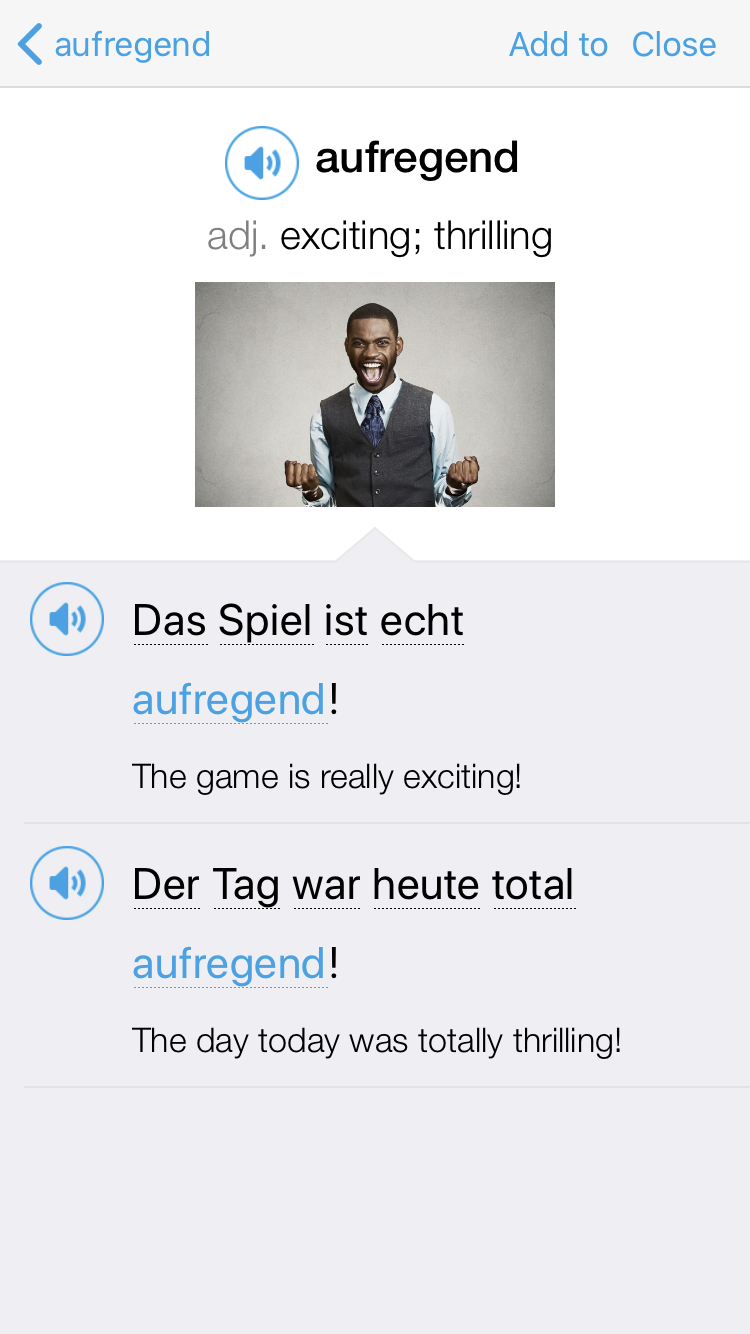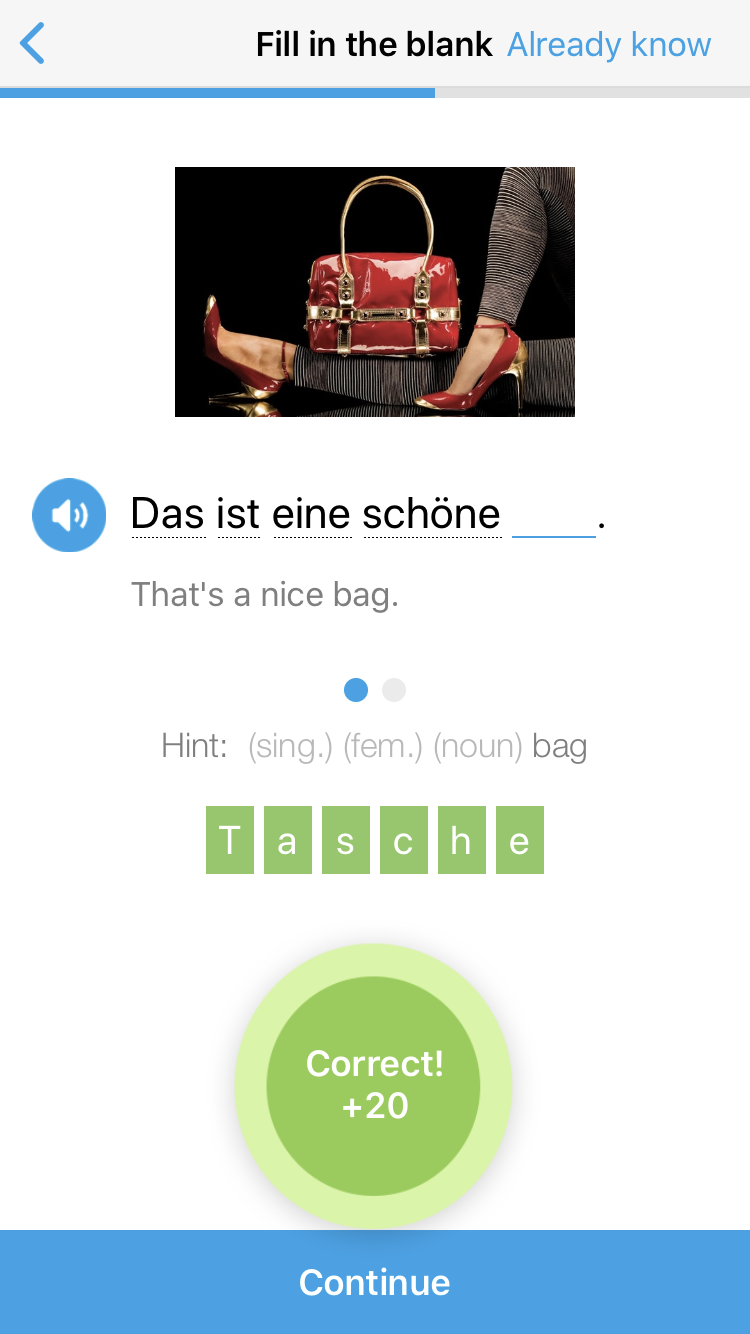How to Say What Is Wrong in German
Do you have cups in your cabinet?
Is your nose full?
Have no idea what I'm talking about? Then it's time to learn some German slang!
By adding more everyday phrases to your useful German greetings and World Cup German words, you'll sound less like a textbook and more like a native.
Here are ten German slang phrases that will give you instant street credibility in Germany.
Download: This blog post is available as a convenient and portable PDF that you can take anywhere. Click here to get a copy. (Download)
10 German Slang Phrases to Sound Like a Native
To hear many of these phrases used in context by native German speakers, try FluentU.
With interactive captions that give instant definitions, pronunciations and additional usage examples, plus fun quizzes and multimedia flashcards, FluentU is a complete learning package.
Check it out with the free trial, and keep your ears and eyes open for the German phrases in this list.

1. Auf dicke Hose machen
Literally, this phrase means, "To act as if you have fat pants." It is used to describe someone who is boasting, bragging or generally pretending to be better than they really are, especially when it comes to possessing money or wealth.
Where does this phrase come from? Is there a contest among the German people to possess the largest pants? No, though it sometimes seems like that among hip-hop aficionados.
The "fat pants" refer to the bulge in one's pocket made by a well-filled wallet. "Auf dicke Hose machen" is therefore used to describe those who feign that their money pouch takes up more space than it really does.
It's worth noting that "auf dicke Hose machen" is frequently used in combination with the accusative in the phrase "einen auf dicke Hose machen" (see examples below). However, it is just as well to use it without.
Examples:
Mach mal nicht so einen auf dicke Hose.(Don't be such a braggart!)
Paul macht auf dicke Hose und gibt eine Lokalrunde.(Paul acts like he has money to spend and buys drinks for the whole bar.)
2. Gebongt sein
In German aBon (pronounced "bong") is the receipt you get after making a purchase. Therefore, in common parlance the verbbongen refers to ringing something up on a register (literally putting something onto aBon), thereby settling the transaction.
If something isgebongt, it means it is booked, decided, or agreed upon. In almost all cases this phrase is used in the form ofIst gebongt to signify that a matter is settled or that you have come to an agreement.
Examples:
Treffen wir uns morgen um drei? — Ok, ist gebongt.(Can we meet tomorrow at three?— Ok, agreed.)
Pass auf, dass Du den Alarm anstellst, bevor Du gehst. — Gut, ist gebongt.(Make sure you switch the alarm on before you leave.— Ok, I will.)
3. Was geht ab?
"Was geht ab?" is the German equivalent of "What's up?" or "What's happening?". It is used as a greeting and to inquire after the other person's wellbeing in a very informal way. If you are a teenager, you might also be able to pull off the even shorter "Was geht?" but anyone nearing thirty should stay away from it.
If asked in the aforementioned fashion, common replies are either "nicht viel" (not much), "alles gut" (everything is fine) or "einiges" (a lot). Keep in mind that this is a very casual expression. If you can't pull off "what's up" in English, you should probably stay away from the German equivalent as well. The phrase can also be combined with other greetings (see "Na?").
Examples:
Was geht ab? — Nicht viel.(What's happening?— Not much.)
Was geht ab? — Viel. Bei mir ist derzeit einiges los.(What's up?— A lot. There's a lot going on with me right now.)
4. Nicht alle Tassen im Schrank haben
I can only imagine the confusion in your face if, while on a visit to Germany, a native strode up to you and asked if you still had all your cups in the cabinet. Is that person just a socially awkward tableware enthusiast trying to make conversation?
Unfortunately, no. Instead, the person is expressing doubt about your mental faculties. It is the beautiful German way to ask if you've lost your marbles. As to why the loss of dishes or colorful glass balls signifies a deterioration of your senses, beats me.
Examples:
Tausend Euro für ein T-Shirt? Hast Du nicht mehr alle Tassen im Schrank?(A thousand bucks for a t-shirt? Have you lost your mind?)
Er sagt, dass ich schuld bin? Der hat doch nicht alle Tassen im Schrank!(He says it's my fault? I think he's not right in the head!)
5. Na?
"Na?" might be the shortest way of asking about someone's well being in any language. It is a way to say both "hello" and "how are you doing?" in one. Many confused foreigners have found themselves under the expectant gaze of a German speaker after this well-meaning monosyllabic greeting.
To express your intentions a little clearer, "Na?" can also be combined with other forms of greeting, like in "Na, alles gut? ", "Na, wie gehts?" , or the previously mentioned "Na, was geht ab?" .
The best thing, however, is that "Na?" also serves as a reply to itself. "Na? – Naaa?" is a complete conversation in which both parties have said hello and asked how life is going. There is a special intonation to it, so it might be best to ask a native speaker to teach you the correct way.
Examples:
Na, alles klar? — Ja und bei Dir?(Hey, everything good?— Yes, you?)
Na, Du? — Naaa?(Hi, how are you doing?— Hey, and you?)
6. Bock haben
"Bock haben " means to be "in the mood for " or "up for " something. In the negative it means to be uninclined to engage in a certain activity. It's the same as "Lust haben " (to have a lust for something), only in a more colloquial form.
What's confusing about the phrase is that "Bock " is actually the German word for male goat. No kidding. But before you ask yourself what is wrong with Germans and their metaphors, let me point out that it probably derives from the Romani word "bokh " which means hunger. It seems that over time not only was the spelling adapted to German, but its meaning came to denote a metaphorical hunger for anything – not just food.
Today "Bock haben " is a common way of expressing your inclination or disinclination for doing something. It is also entirely possible to have "null Bock, " when your enthusiasm is so low it arrives at zero. Some people even have "Böcke, " meaning more than oneBock, but it's not very common.
Examples:
Wir gehen heute Abend ins Kino. Hast Du auch Bock?(We are going to the movies tonight. Wanna come?)
Da habe ich überhaupt keinen Bock drauf.(I absolutely do not want to do that.)
7. Die Nase voll haben
This phrase literally means "to have your nose full". However, it is neither a way to describe someone with a headcold, nor a person with an expensive drug habit. Instead, in German if you have your nose full, it means that you are fed up with or sick of something.
Its origin is probably found in the slang of criminals in earlier times who, after being delivered to prison, sometimes also received a few punches to the nose (a nose full of punches) from the guards. That's a situation that most of us would probably be fed up with very quickly.
If you want to emphasize the severity of your discontent, you might even speak of having your nose filled to the brim. "Die Nase bis obenhin voll haben " states that you are entirely fed up with the situation. And finally, you might replace "die Nase " with its less polite cousin, "die Schnauze " .
Examples:
Ich habe die Nase voll von der lauten Musik.(I'm sick of the loud music)
Ich habe sowas von die Nase voll!(I'm so very fed up!)
8. Chillen
The German verb "chillen " comes from the English "to chill ". It shares the meaning of its anglophone counterpart: to hang out, rest, and generally take it easy. Be aware, however, that "chillen " is not used in the sense of cooling or "to give someone the chills".
The word also has an adjective form, "chillig, " which is mostly used to describe a laid-back atmosphere or relaxing surroundings you would encounter while having a chill night.
Interestingly, in German you often chill in rounds, though usually just one. "Eine Runde chillen " is an important part of the weekend activities for many younger Germans. But don't worry, once the first one is done, you can usually just chill another round.
Examples:
Wir wollen an den See fahren, eine Runde chillen.(We want to go to the lake and chill for a bit.)
Nach der Arbeit muss ich erstmal chillen.(After work I will have to chill first.)
Wir sind beide müde, deswegen machen wir uns eher einen chilligen Abend.(We are both tired so we will rather go for something relaxing tonight.)
9. Einen dicken Hals haben / bekommen
Have you ever been so angry that you could feel your neck muscles tensing and the veins at its front pulsing? Because that's exactly what this phrase is describing.
It's an expression of anger, rage, and general annoyance. Whether someone already has or is on the verge of getting a swollen neck, you had better stay out of their way.
You can even forgo to mention your neck's thickness and instead say "Ich bekomme so einen Hals " while showing its future dimensions with your open hand held in front of it. It is also completely possible to leave out any further description and use "Einen Hals auf jemanden haben. "
Example:
Ich krieg' hier gleich 'nen dicken Hals!(In a second here, I'm gonna bust!)
Ich bekomme so einen Hals, wenn ich das höre!(I'm getting so angry when I hear this stuff!)
Mann, hab' ich einen Hals auf den wegen letzter Woche.(Boy, am I angry at him for last week!)
10. Aus der Reihe tanzen
This last phrase is used to describe someone who stands out by getting out of line or acting different from everyone else. It literally means to dance outside the line.
Aus der Reihe tanzen can be used in both a negative and a positive way. It can describe a troublemaker, or someone who is simply doing their own thing. Just like in real life, there is a fine line between the two.
The origin of this saying is unclear. Though Germans like to be organized, they do not in fact make everyone dance in a line at the club – no matter what others might be claiming.
Examples:
Sie muss immer aus der Reihen tanzen!(She always has to get out of line!)
Er tanzt gerne etwas aus der Reihe.(He likes to do things a little different than everyone else.)
Und das mir keiner aus der Reihe tanzt!(There better be nobody getting out of line!)
Download: This blog post is available as a convenient and portable PDF that you can take anywhere. Click here to get a copy. (Download)
And One More Thing...
Want to know the key to learning German effectively?
It's using the right content and tools, like FluentU has to offer! Browse hundreds of videos, take endless quizzes and master the German language faster than you've ever imagine!

Watching a fun video, but having trouble understanding it? FluentU brings native videos within reach with interactive subtitles.

You can tap on any word to look it up instantly. Every definition has examples that have been written to help you understand how the word is used. If you see an interesting word you don't know, you can add it to a vocabulary list.

And FluentU isn't just for watching videos. It's a complete platform for learning. It's designed to effectively teach you all the vocabulary from any video. Swipe left or right to see more examples of the word you're on.

The best part is that FluentU keeps track of the vocabulary that you're learning, and gives you extra practice with difficult words. It'll even remind you when it's time to review what you've learned.
Start using the FluentU website on your computer or tablet or, better yet, download the FluentU app from the iTunes or Google Play stores.
If you liked this post, something tells me that you'll love FluentU, the best way to learn German with real-world videos.
Experience German immersion online!
How to Say What Is Wrong in German
Source: https://www.fluentu.com/blog/german/german-slang-phrases/

0 Response to "How to Say What Is Wrong in German"
Post a Comment